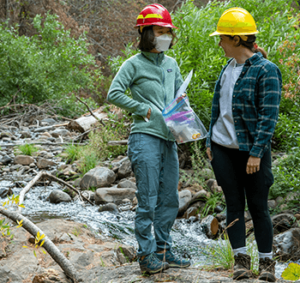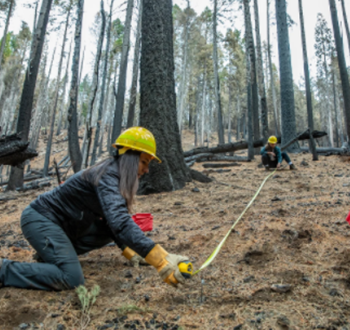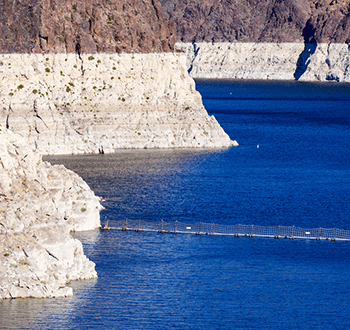
Arising from a confluence of atmospheric, vegetation, hydrological, and human factors, wildfires increase runoff and landslides, and affect soil water retention, water availability, and water quality.
Photo Credit: Marilyn Sargent/Berkeley Lab
With concerns over Western U.S. water supply at an all-time high, scientists are especially motivated to reveal the feedbacks between wildfire and hydrological processes taking place across the landscape. In California, where much of the water supply originates from snowpack either in the Sierra Nevada mountains or further away in Colorado’s Rocky Mountains, motivation has grown to determine how more-intense and frequent wildfires are affecting these water reserves. Berkeley Lab researchers are leading studies exploring the connections between wildfire and hydrology in Western ecosystems.
Changes in Post-Wildfire Water Availability

Berkeley Lab researchers used a numerical model of California’s Cosumnes River watershed to shed light on how by reducing the number of trees, wildfires can affect the amount of snowpack and the timing of when snow melts and feeds the river. The study found that post-wildfire conditions resulted in greater winter snowpack and subsequently greater summer runoff as well as increased groundwater storage. The researchers’ model quantifies changes in stream flow and groundwater levels across space and time, metrics that are extremely important to water managers after a wildfire. Now the team is using that same model to predict how areas affected by this year’s Caldor Fire in that same river basin are likely to respond to precipitation events this winter. Read more.
New Methods for Measuring Wildfire Groundwater Impacts

Berkeley Lab scientists have devised new methods for measuring how California Wine Country wildfires could affect the groundwater that is pumped from far below the Russian River to provide drinking water for 600,000 northern Californians. Michelle Newcomer works in partnership with the Sonoma County Water Agency to determine how wildfires may be altering riverbed sediment and microbes which naturally filter contaminants from the water. She collects water samples from throughout the watershed after a wildfire or post-wildfire storm, and uses computer models to understand how fire is affecting these natural filtration processes.
Understanding Ecosystem Water Use Impacts

Berkeley Lab faculty scientist Trevor Keenan leads a DOE-funded Early Career Research Project to understand how drought, extreme heat, and wildfire are impacting ecosystem water use across diverse coastal regions in the western U.S. where tree mortality rates are particularly high. The researchers are working to identify the spatial distribution of ecosystems in which water-mediated ecosystem functions are particularly susceptible to extreme events including wildfire, and to track seasonal changes in water limitations over time. For this research, the scientists will be using a machine-learning approach to assess future fire across the western U.S., and interactions with societal water resources.